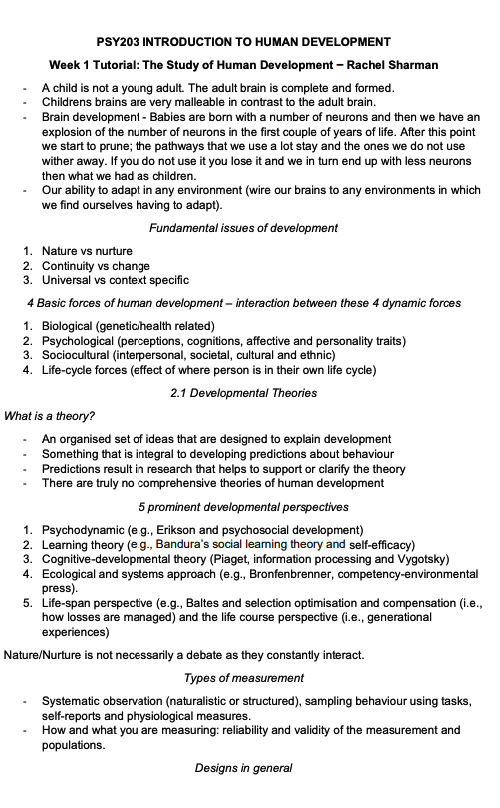PSY203 Introduction to Human Development
Summary:
The PSY203 course, “Introduction to Human Development,” led by Rachel Sharman, delves into the complexities of human growth and change over time. The course begins with an exploration of brain development, emphasizing the malleability of children’s brains compared to adult brains and the process of neural pruning. Fundamental issues in human development, such as nature vs. nurture, continuity vs. change, and universal vs. context-specific development, are also discussed. Students are introduced to various theoretical frameworks, including Psychodynamic theories, Learning theories, Cognitive-developmental theories, and more. The course underscores the importance of empirical research and the use of various methods like systematic observation, self-reports, and physiological measures. Students also explore the Biopsychosocial Model that combines biological, psychological, and sociocultural forces to explain human development. Questions regarding extended human lifespans, ethical considerations, and cultural influences on development also add depth to the course. Neuroscience is a vital tool for understanding developmental phenomena such as adolescent risk-taking and age-related memory issues. Overall, the course provides a comprehensive look at the multidimensional and interactive forces that shape human development across the lifespan.
Excerpt:
PSY203 Introduction to Human Development
PSY203 INTRODUCTION TO HUMAN DEVELOPMENT
Week 1 Tutorial: The Study of Human Development – Rachel Sharman
- A child is not a young adult. The adult brain is complete and formed.
- Children’s brains are very malleable in contrast to the adult brain.
- Brain development – Babies are born with several neurons, and then we have an explosion of the number of neurons in the first couple of years of life. After this point, we start to prune; the pathways we use often stay, and the ones we do not use wither away. If you do not use it, you lose it, and we, in turn, end up with fewer neurons than we had as children.
- Our ability to adapt to any environment (wire our brains to any environment in which
we find ourselves having to adapt).
Fundamental issues of development
1. Nature vs nurture
2. Continuity vs change
3. Universal vs context-specific


Reviews